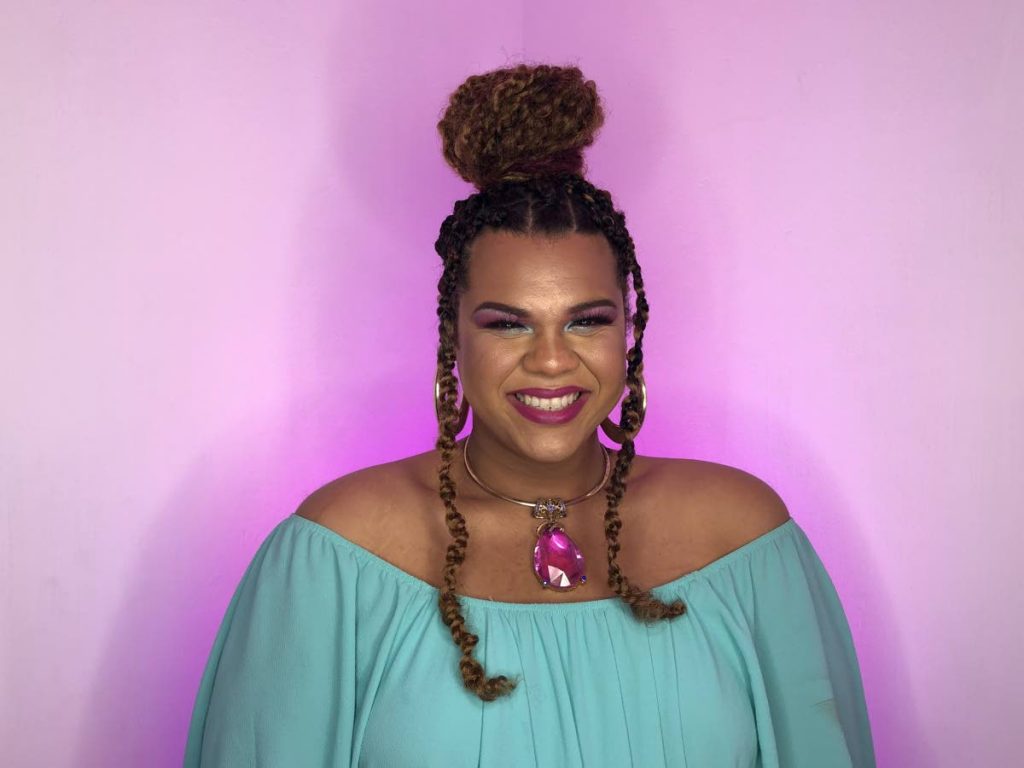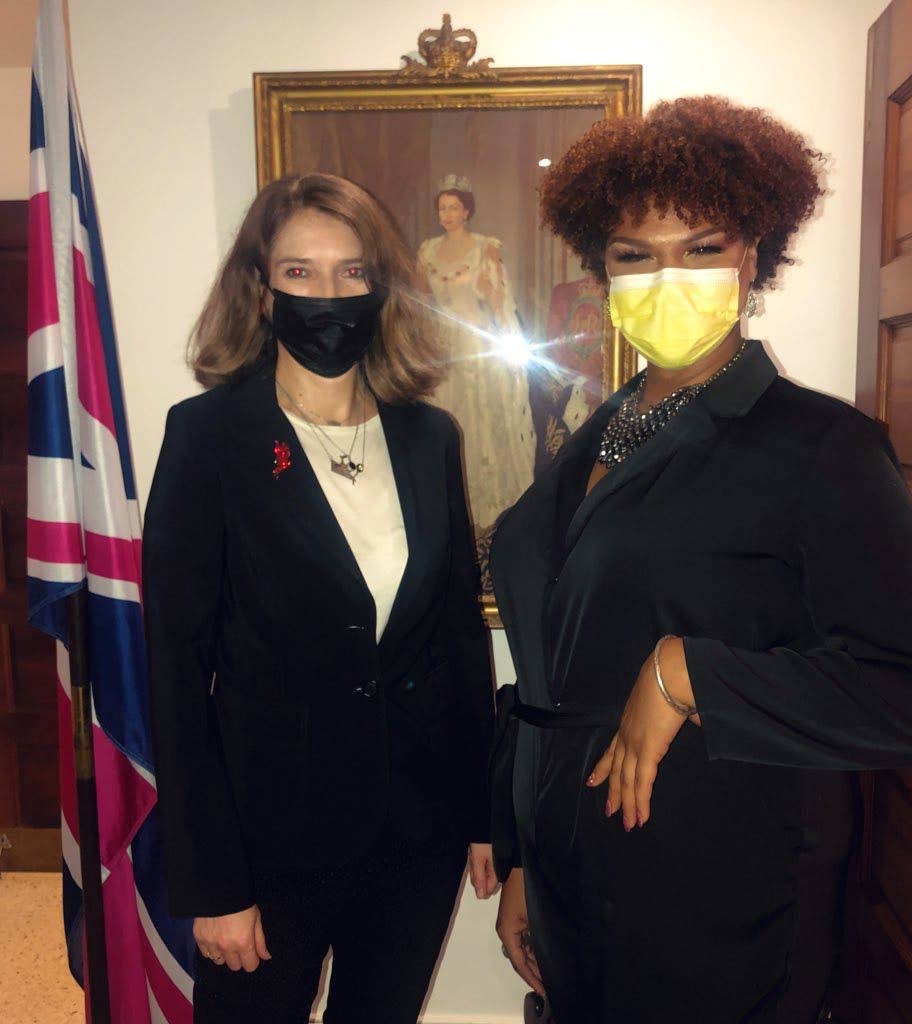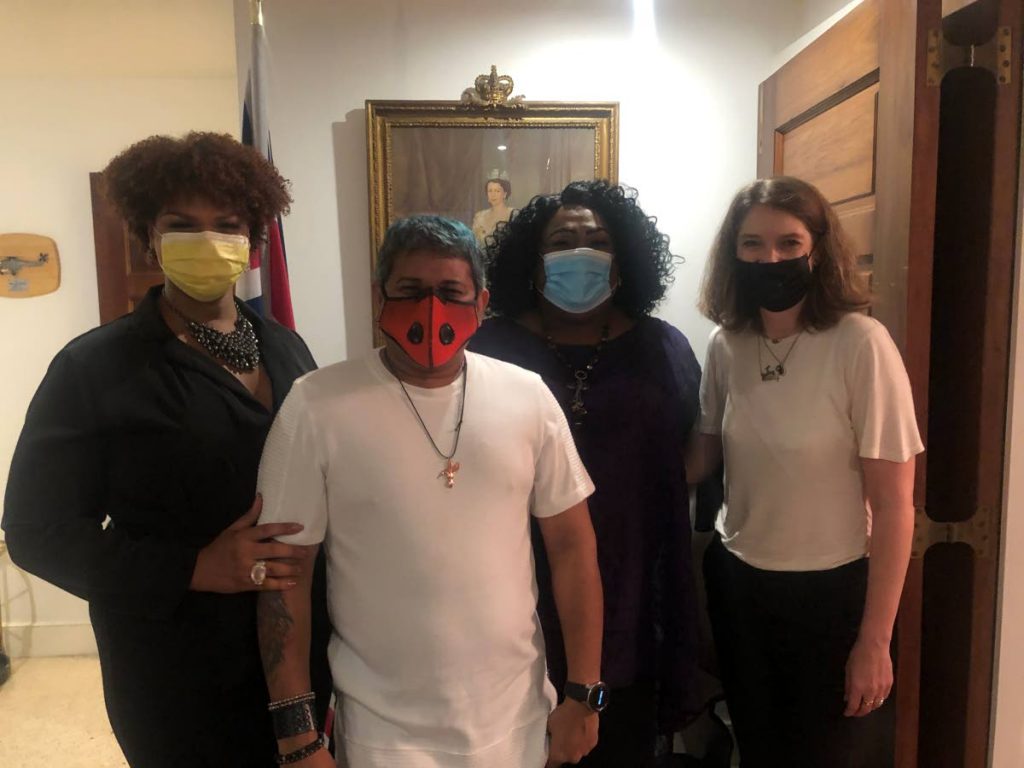Xoë Sazzle on transgender life; 'I always knew I was different'

REMEMBER the day you realised you were a boy or girl? Remember how that felt? Was it just a single day or a process? Did it take years of realising what gender meant? Did you have to peel back the layers of what it meant to be a boy or a girl – to keep or discard what felt right for you?
Did you just go along with what your family and society expected of boys or girls, for instance that girls should wear pink dresses and boys should not cry?
For Xoë Sazzle (whose stage name as a musical performer is Mizz Jinnay), the process of self-discovery is just that – a process.
On the day of her birth, (Xoë, pronounced Zoey) under the heading of gender, the male box was ticked for the baby – but for much of her life, she has gone through a process of living outside that box.
Sazzle, a transgender woman from Diego Martin, said the transition from male to female has been tough, but she is happy to be exactly who she is today and wants to help others go through the process of transitioning.
Newsday talked with Sazzle, 29, on the 12th International Transgender Day of Visibility, celebrated on March 31 annually.
As community liaison officer for the Trinidad and Tobago Transgender Coalition (TTTC), she organised a demonstration which featured professionals across disciplines to commemorate the day in the form of a digital demonstration. This was the first official commemoration in Trinidad and Tobago.

-
"This year is the first time the envelope is being pushed to really acknowledge the day as widely and as publicly as possible."
She said the demonstration was done digitally because of the restrictions to limit the spread of covid19, which ban large gatherings.
A nine-minute video posted on the Instagram page of the TTTC features Sazzle; transgender woman and member of the TTTC Brandy Rodriguez; British High Commissioner Harriet Cross; head of the Institute of Gender Studies at UWI and Newsday columnist Dr Gabrielle Hosein; Lost Tribe creative director Valmiki Maharaj; award-winning Jamaican photographer Marlon James; and vice president at Nickelodeon in Los Angeles Paul J Medford.
Asked how the video was received, Sazzle said, "The responses were overwhelming across platforms such as Twitter, Instagram and Facebook. I saw it being reposted by many people. I also reached out to several people, asking them to share it, and the response has been overwhelming."
She hopes the message will reach through a cross-section of society to those who may not understand or support the transgender community.
"We hope it gets to those who aren't necessarily interested in human rights or LGBT+ rights."
Asked what she and the organisation hope will be the outcome, she said visibility.
"We saw the digital demonstration as the first step toward education. We want to sensitise and educate the population on transgender people. People first – and then we can start having conversations about the issues affecting the community, because we cannot convince people someone is entitled to human rights if people don't consider that person to be human."

Sazzle believes there is validity in initiating the conversation and representation – which are not currently happening in Trinidad and Tobago.
TTTC collaborates with a community of psychologists and psychiatrists such as Dr Katija Khan, a psychologist based at the Eric Williams Medical Sciences Complex. The team of mental health specialists, Sazzle said, are aware of the issues presented by transgender people and are prepared to provide support.
Asked the size of the transgender population in Trinidad and Tobago, Sazzle said gathering information has been difficult.
"One of the main problems with representing our numbers is that in the past 20 years, about 90 per cent of the (trans) population have migrated. They have either elected to migrate or sought asylum specifically because of the problems connected to navigating a trans identity locally."
The estimated number of those who remain is about 100. This number reflects only those who have openly identified as transgender. Taboo and fear of being ostracised or hurt keep many people from identifying, Sazzle said many people are going through the challenge silently.
"Many are cloaked in shame or fear because of the circumstances in which they live."
For those who cannot begin to imagine the transgender experience, she said, "It is like waking up one morning looking in the mirror to see someone else. Or walking into an office and someone insists you're another gender."
Some people reach that realisation at five years old, and others at 25. Her transition began when she was 27.
"Waking up is the point of acknowledging the internal experience and allowing it to guide the external representation of how that person feels inside."
She cannot recall the moment she realised she was transgender, or that there was some disconnect in how she felt and how she had to present herself to the world. But she always knew she was different.
"I had a conversation with my mother about my childhood...At this stage, I look back to realise I did not see a genuine expression similar to myself in the world. I could not make sense of myself, but knew my future would be different from what I saw."
Sazzle said transitioning, which includes surgical/chemical transformation, choice of dress and choice of pronouns – or all three – is not only experienced by the person going through the transition, but also has an impact on the people in his or her life.
For her, it has meant making sacrifices – one being her comfort zone at home. Transitioning meant a change in family dynamics because of the challenges her family faced in coming to terms with and understanding the changes she was going through.
"It meant things would never be the same. Not that it is a negative expereince, but there are rough patches."
Another sacrifice, she said, was trading in her male privilege.
"I realised I could not do things like travelling alone, like I did in the past, the acknowledgement that as a woman it is not advised to travel alone – being more vulnerable to harassment, which all women experience."
But,Sazzle said, "I must say I have not experienced very much negativity being directed to me. I understand that people close to me have experienced negative reactions to my choices."
She sees negative reactions simply as as a lack of understanding and a lack of the desire to understand.
"The most negative of the experiences I have had was when I was forced to decide to either live by my identity or leave my job,"
She left her job as a talent assistant at a local television station last year.
"Other than that, regarding friends, family and community – the broad majority of people just needed time. Different people need different amounts of time. Just as I have transitioned and continue going through a transition, so are they."
She said people should be given time not merely to accept someone else's decision to transition as the right thing to do, based on things such as religion – but a journey toward deeper understanding.
"This is the case even for my family. There is still that desire to live together in a space of love and respect – even if they aren't ready to be in certain situations where they may not feel comfortable."
Asked what advice she would give to young people who may be transgender and are experiencing it in silence, she said, "Be patient. Give yourself time. It is important also for your security. Living on an island, we must be honest with ourselves about our living and work situations.
"Navigating an openly trans identity can be detrimental to all those things, including everyday security. After ensuring safety, follow your heart to safely becoming what feels like a connection between how you feel inside and the external expression."
She urges young people to work toward become what feels like the most authentic version of themselves.


Comments
"Xoë Sazzle on transgender life; ‘I always knew I was different’"